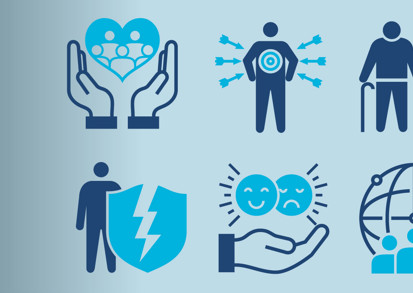
Earlier in the year, we told you about the Know our Customer project which intends to ensure the data we hold about our residents is useful and can help us tailor our service to them. We also want to improve the processes for capturing important data in line with regulatory requirements.
In another strand of the project, we wish to develop customer segmentation or ‘profiles’ based on needs, expectations and preferences to develop more tailored services. An immediate priority that you will recall is focussing on improving the quality of ‘vulnerability’ information we have on our residents and the service around that up-to-date information.
Thank you to those who took part in our consultation on ‘understanding vulnerability’. We will be issuing vouchers to the winners of the prize draw for those who completed the survey soon. Below is summary of what residents told us in the consultation and some FAQs about the new feature on My Account.
Consultation feedback
- The aim of the consultation was to test perception of how we support residents with vulnerabilities, the language around ‘vulnerability’ itself and 16 draft icons developed for My Account.
- As well as a survey, residents were asked similar questions at a repairs focus group, focussing on communication.
- The focus group also reviewed six revised icons (see below) following ongoing meetings and conversations with staff and wider research on the housing and health sector.
- 80 residents responded to this consultation via the survey and focus group and this is the summary of what they told us:
- Need for better support: Residents in the consultation felt that we must generally improve how we support those with specific needs or circumstances especially those with non-visible vulnerabilities and cultural considerations.
- Icon improvements needed: While the draft icons were understood and appreciated, residents wanted broader, more inclusive categories with space for explanation and detail underneath.
- Language sensitivity: The term “vulnerability” was seen as potentially stigmatising by some residents. Several alterative suggestions were made but “service adjustments” was preferred as a more respectful and accurate phrase.
- Frustration with repetition or lack of recognition: Many were frustrated by having to repeatedly explain their circumstances to Notting Hill Genesis staff and contractors and in many cases, where it wasn’t considered when carrying out a service.
- Training and communication: Residents emphasised the importance of staff and contractor training, respectful behaviour, reassurances about who has access to this information and clear communication about what a service adjustment experience would look like in practice.
You can read a more detailed summary of the feedback from residents here.
The six service adjustment icons we decided on are below.
![]()
Improved service adjustment feature on My Account - FAQs
The new and improved function we have created will help us to capture and log residents’ service adjustment needs.
On the back of resident feedback, ‘service adjustment’ is a more considerate term than ‘vulnerability’. A service adjustment need arises when a housing issue disproportionately impacts a resident due to their personal circumstance or characteristic. As a result, we provide additional support or a more tailored service to ensure they are not disadvantaged.
If you have provided us with any information about a particular need, protected characteristic or personal circumstance, one or more of six icons will appear on your profile. This will indicate that you have had that conversation with someone at Notting Hill Genesis and we have captured the specifics. If something looks wrong, or you can’t see any icon representing information you have disclosed to us, contact your housing officer as soon as you can.
Residents have the option to disclose to us the specific nature of their need or circumstance (physical, non-visible, mental health condition, chronic health condition, neurodivergence or ‘life circumstances’) as well as anything they feel is needed for us or our contractors to know. For example, that it may take you longer to answer the door or that English is not your first language and a translator/translated text may be required. Residents should only disclose information they are comfortable to share about their service adjustment need.
A housing association can collect information about a tenant’s health or disability to fulfil its legal duty to provide reasonable adjustments or support under the Equality Act 2010 or other housing-related legislation. This falls under the "social protection" condition of Article 9(2)(b) under GDPR, which allows processing of special category data when it's necessary for employment, social security, or social protection law.
At this stage, the more information we can gather, the better we can begin to tailor services to you. We can begin to notify contractors about helpful service adjustments like ‘please allow extra time to answer the door’ or ‘text, don’t call’. We also need to prepare for upcoming legislation which will require us to prioritise residents for repairs. The initial phase of this is to create a better way to log and update this information. We are working through with the operational teams involved how to turn the information we have captured into tangible changes in service delivery. Rest assured we will get there and the data you shared with us is valuable, but it may take time before you see action in this regard.
Throughout the consultation, residents highlighted several scenarios or conditions that aren’t necessarily a disability but would be beneficial for us to know about to ensure you have the best possible experience of a service. This ‘life circumstance’ icon will enable residents to disclose situations or conditions an individual might find themselves in, temporarily or permanently which may affect them day to day. Examples could include broken limbs or minor injury, pregnancy, having a newborn, being a carer, grief, addiction, lack of access to digital technology, English as a second language or financial concerns. This could also include protected characteristics included in the Equality Act such as religion or ethnicity if the resident wished to inform us of a specific religious or cultural practice.
We need to now review our current service delivery and processes alongside this data collection to make more informed decisions about tailored services. This will be the next focus of this project. We will set clear guidance and advise housing officers and property managers to manage expectations with regards to service adjustment information being captured and in line with upcoming housing legislation.
In this case, information shared with third parties (predominantly contractors delivering repairs in your home or communal area) will be the necessary service adjustment detail (e.g. takes longer to answer the door). New guidance for our staff will aim to ensure that the specific nature of your need or circumstance (e.g. your disability) won’t be shared with contactors unless you give us explicit consent to do so.
We are creating improved functionality and guidance for our staff to ensure the right information is stored in one place and regularly checked and updated if necessary. As part of this first roll out, we will be reviewing information we currently have to ensure that everything is up to date. The new process will aim to ensure that residents do not need to keep repeating this kind of information to us, which we understand can be frustrating and disappointing.
No. This information is for you to disclose to us voluntarily and you do not have to tell us. The more information we do hold, the better opportunities we have of supporting you and your household accordingly. You will have the opportunity to disclose ‘prefer not to say’ if you wish. There is other information that we are legally obliged to hold on you in relation to your tenancy or lease. Your housing officer or property manager can support you with any questions you have on this.
Any information captured will be done so with your explicit consent when in conversation or correspondence with your housing officer or property manager. There are other resident facing teams who may support you with a query or service who may also ask you about any service adjustment information we may need to log. This includes our customer service centre team, repairs and complaints teams.
Where possible, we still ought to capture that detail. Housing officers or property managers having an awareness of this kind of information prior to making a visit or speaking on the phone or by email can be helpful for both staff and residents. In line with the regulator of social housing’s consumer standards, we are expected to consider the diverse needs of our residents in relation to the housing and landlord services we provide. In line with upcoming housing legislation, there may also be certain health conditions or circumstances that would require a priority service.
Contact your housing officer or property manager to inform them and this will be updated. You may also be occasionally reminded by us to keep your information up to date.
Yes. Any lead tenants will be able to tell us this information for any household member living with you.
Yes. You have the right to withdraw consent at any time in line with general data protection regulation (GDPR). Please contact us if you wish to withdraw this information at any time.
Any service adjustment information you share with us won’t affect your tenancy or have a detrimental effect on the service you receive from us in any way.
For now, our staff are the only ones who can update this information. In time, we would like to develop the opportunity for residents to update information themselves. Not just service adjustments, but other things like contact information. Depending on what is updated, this may prompt follow up contact with your housing officer or property manager.
Yes, this information will still be captured whether you are using My Account or not. Please contact your housing officer or property manager when prompted to do so.




